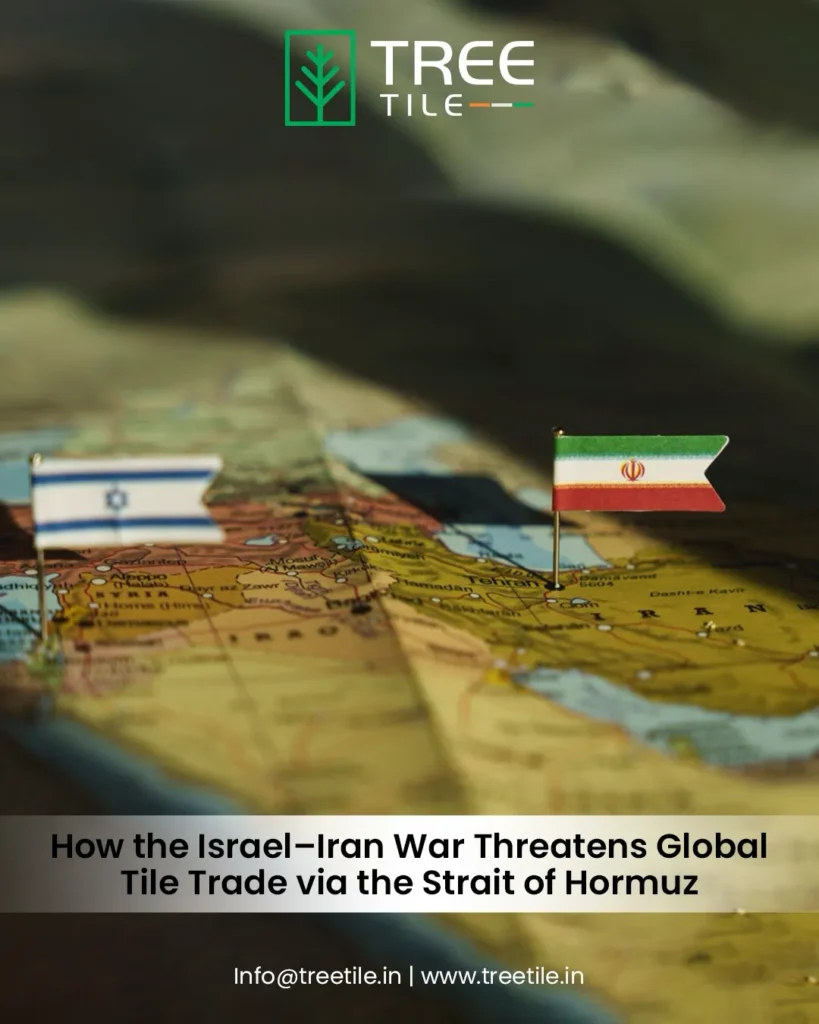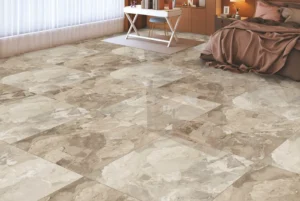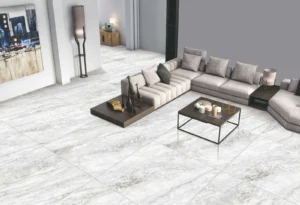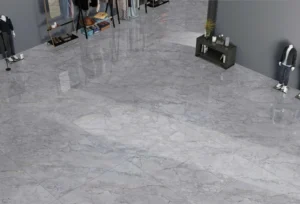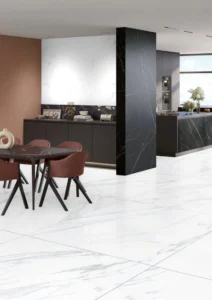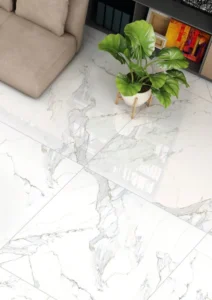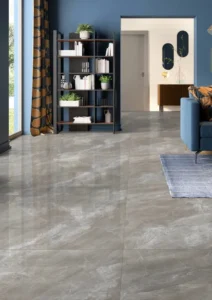At Tree Tile, we are proud to be a leading exporter of premium wall and floor tiles based in India’s ceramic heartland and we are certified 1-star exporter from India. With years of expertise and a deep understanding of global markets, we specialize in delivering high-quality tiles that meet the diverse needs of customers across Europe, the Middle East, and Africa. What sets Tree Tile apart is our commitment to quality, timely shipments, and innovative tile collections — including glossy, matte, wood-look, and digital printed designs — that are crafted to suit modern architectural trends worldwide.
Our proven track record on trusted platforms and reliable export operations make us a preferred partner for builders, retailers, and designers looking for excellence and consistency. As global trade faces unprecedented challenges, Tree Tile’s resilient supply chain and strategic logistics ensure that our clients receive their tiles without compromise, maintaining trust and satisfaction across international markets. Here’s what we have shared our learning after Iran and Israel war which had impacted tiles trade via the Straits of Hormuz
Article in Brief:
- Geographic Overview of the Strait of Hormuz
- Importance for Sea Shipping Routes of Tiles Exports from India, China, and UAE to Europe and the USA
- Volume of Tiles and Construction Material Shipments That Pass Through This Strait
- Scenarios if Iran Blocks the Strait Due to War Escalation
- Alternate Shipping Routes and Their Downsides for the Tiles Market
- Why Tiles Are as Important as Oil in the Context of Global Infrastructure
- Impact on Container Movement, Delays at Ports, and Stuck Shipments
Understanding the Strait of Hormuz: A Critical Passage for Global Tiles Trade
Geographic Overview of the Strait of Hormuz
The Strait of Hormuz is a narrow waterway located between the Arabian Peninsula and Iran, connecting the Persian Gulf to the Gulf of Oman and the Arabian Sea. Spanning approximately 21 miles (33 kilometers) at its narrowest point, it serves as a vital maritime corridor for international shipping. Despite its small size, the strait’s strategic location makes it one of the most important chokepoints in global trade, especially for energy and goods moving between the Middle East, Asia, Europe, and the Americas.
Importance for Sea Shipping Routes of Tiles Exports from India, China, and UAE to Europe and the USA
For the global tiles industry, the Strait of Hormuz is a critical transit route. Major tile manufacturing hubs such as India, China, and the United Arab Emirates rely heavily on sea shipping routes passing through this strait to export their products. Tiles produced in these countries are shipped to key markets in Europe and the USA, where demand for construction and interior design materials is consistently high. The strait’s accessibility ensures efficient and cost-effective transportation, enabling exporters to meet delivery deadlines and maintain competitive pricing.
Volume of Tiles and Construction Material Shipments That Pass Through This Strait
A significant volume of tiles and related construction materials transit through the Strait of Hormuz every year. While the strait is globally renowned for oil shipments, it also handles a substantial share of containerized cargo, including ceramic and porcelain tiles, raw materials, and packaging supplies vital to the tiles industry. Disruptions in this passage can lead to delays, increased freight charges, and supply shortages, underscoring the strait’s indispensable role in sustaining the global tiles supply chain.
Wall Tile Vs Paint: Top Benefits Of Wall Covering Style, Value & More
Tiles Trade at Risk: What Happens If the Strait of Hormuz Closes?
Scenarios if Iran Blocks the Strait Due to War Escalation
In the event of heightened conflict leading Iran to block the Strait of Hormuz, global shipping through this critical chokepoint would face immediate disruption. Such a blockade could halt or severely restrict the flow of goods, including tiles and construction materials, that transit this narrow passage daily. Given the strait’s strategic importance, even a partial closure would trigger widespread delays, forcing ships to reroute around longer and costlier paths, significantly impacting delivery schedules and supply chains.
Alternate Shipping Routes and Their Downsides for the Tiles Market
If the Strait of Hormuz were closed, exporters would have to rely on alternate routes such as the longer journey around the Cape of Good Hope or through the Bab el-Mandeb Strait. These alternatives significantly increase transit times, fuel consumption, and shipping costs. For the tiles market, which often operates on tight delivery schedules and competitive pricing, these added expenses and delays could lead to supply shortages, contract penalties, and loss of customer trust. Infrastructure at alternate ports may not be as well-equipped to handle the surge in cargo, compounding logistical challenges.
20×120 Cm Porcelain Tiles 2025: Wood Look, Parquet Effect & Applications
Tree Tile: Building a Global Presence in Tiles Export
Based in India’s renowned ceramic hub, Tree Tile has established itself as a trusted name in the export of premium wall and floor tiles. Over the years, the company has successfully expanded its footprint across Europe, the Middle East, and Africa, delivering high-quality ceramic and porcelain tiles that meet the diverse needs of international markets.
The company’s unwavering commitment to consistent product quality, timely delivery, and customer satisfaction has helped it forge strong, long-lasting relationships with clients in over 40 countries. By combining innovative tile designs with reliable export practices, Tree Tile continues to strengthen its global presence and reputation as a dependable partner in the international tiles industry.
Tree Tile: The Most Trusted Partner Transforming Importers’ Frustrations Into Success
Strait of Hormuz Crisis: The Blocked Lifeline of the Global Construction Materials and Tiles Industry
Why Tiles Are as Important as Oil in the Context of Global Infrastructure
While the Strait of Hormuz is globally recognized as a critical artery for oil exports—handling nearly 20 million barrels per day, about 30% of the world’s oil trade—it also plays an indispensable role in the shipment of construction materials, including ceramic and porcelain tiles. Tiles are fundamental to global infrastructure development, residential and commercial construction, and interior design projects worldwide. Like oil, tiles are essential commodities that support economic growth and urbanization, making their uninterrupted supply vital for maintaining construction momentum and infrastructure quality.
Impact on Container Movement, Delays at Ports, and Stuck Shipments
A crisis or blockade at the Strait of Hormuz would severely disrupt container movements that carry tiles and other construction materials. Ports dependent on shipments routed through this passage would experience congestion, delays, and increased turnaround times. Ships might be forced to wait offshore or reroute via longer, costlier paths, causing cargo to be stuck in transit. These delays can cascade through supply chains, leading to missed deadlines, increased demurrage charges, and higher freight costs. For tile exporters and importers, such disruptions threaten timely order fulfillment and strain relationships with customers.
11 Easy Steps To Keep Plank Tiles Spotless & Strong By Tile Expert
Israel–Iran Conflict May Trigger Freight Surge and Supply Chain Delays for Tiles Exporters
The escalating Israel–Iran conflict is already triggering a significant surge in container freight charges, directly impacting tiles exporters who rely on smooth and cost-effective shipping routes. As shipping groups grow increasingly cautious about navigating the Strait of Hormuz and surrounding waters, freight rates have spiked sharply. This surge in costs stems from heightened risks, longer alternative routes, and increased insurance premiums, all of which squeeze profit margins for tile manufacturers and exporters.
Delays in order fulfillment are becoming an unavoidable consequence of these disruptions. With ships forced to avoid high-risk zones or reroute via longer paths, transit times have extended considerably. This leads to late deliveries, inventory shortages, and challenges in meeting contractual deadlines for both tile manufacturers and buyers. The domino effect of these delays can disrupt construction projects and damage the reputation of exporters who fail to deliver on time.
The conflict’s impact extends beyond logistics to contractual and financial risks. Exporters face potential loss of contracts, penalties for late shipments, and growing customer dissatisfaction as buyers seek more reliable suppliers. The uncertainty and increased costs could push some buyers to explore alternative sources, intensifying competition and pressure on tile exporters operating through the affected routes. In this volatile environment, managing supply chain risks and maintaining strong client relationships become critical for survival.
Best Tile Packaging Practices By Tree Tile LLP: Minimizing Damage And Saving Time
5 Trade Shocks the Tiles Industry Could Face If Hormuz Closes
Sudden Rise in Freight and Insurance Costs for Tiles Shipments
A closure of the Strait of Hormuz would drastically increase shipping risks, leading to a sharp spike in freight charges and insurance premiums. Exporters would face higher transportation costs, squeezing profit margins and potentially increasing tile prices for end consumers.
Delays in Delivery Timelines for Bulk Tile Orders
With the primary shipping route blocked, vessels would need to take longer alternate routes, causing significant delays in the delivery of bulk tile shipments. These delays can disrupt construction schedules and damage supplier-client relationships.
Shortage of Raw Materials and Packaging for Tile Production
Many raw materials and packaging supplies used in tile manufacturing also transit through this route. A blockade could result in shortages, slowing down production and limiting the ability to fulfill orders on time.
Drop in New Orders Due to Market Uncertainty
The uncertainty caused by the blockade would make buyers hesitant to place new orders, fearing supply chain disruptions and price volatility. This decline in demand could negatively impact the revenue and growth prospects of tile exporters.
Redirection of Tiles Exports Through Longer Routes, Increasing Costs and Time
Exporters would be forced to reroute shipments via longer, less efficient paths such as around the Cape of Good Hope. This not only increases transit times but also adds substantial fuel and operational costs, further burdening the tiles trade.
Best Subway Tile Backsplash Ideas For 2025: Modern Design Trends
Tree Tile’s Signature Collections 2025: Designed for Today, Ready for Global Markets
Tree Tile’s 2025 portfolio showcases a diverse range of premium tiles designed to meet the demands of contemporary architecture and interior design. From sleek glossy finishes and sophisticated matte textures to realistic wood-look and stone-look tiles, the collections offer versatile options that blend aesthetics with durability. Tree Tile’s innovative digital printed tiles provide limitless design possibilities, catering to both residential and commercial projects worldwide.
Popular collections such as Golden Tiles Collection 2024, Glossy Finish Tiles, Decora Look Tiles, High Gloss Tiles, Endless Tiles etc. have gained significant traction in international markets, praised for their quality, style, and adaptability. These collections are especially favored in high-end residential developments, hospitality projects, and commercial spaces, reflecting global design trends and client preferences.
With advanced customization capabilities, Tree Tile allows clients to choose from a variety of finishes, sizes, and patterns, ensuring tailored solutions that align with project specifications. This flexibility, combined with Tree Tile’s reliable export logistics, positions the company to effectively serve evolving global markets—even amid challenges in international shipping and supply chains.
20mm Thick Outdoor Porcelain Tiles For Ultimate Durability & Style
Can the Global Tiles Market Withstand a Hormuz Blockade?
Analysis of International Trade Data and Tile Export Volumes
The global ceramic and porcelain tiles market is robust and rapidly growing, with an estimated value of around USD 215 billion in 2025, projected to nearly double by 2034 at a CAGR of approximately 7.3% to 7.5%. Asia Pacific, led by countries like India and China, dominates tile production and export, supplying key markets in Europe, North America, and the Middle East. The volume of tile exports passing through strategic maritime routes such as the Strait of Hormuz is substantial, given the region’s role as a transit point for shipments from India, UAE, and China to global markets. Any disruption here threatens to impact a significant share of this trade.
Feasibility of Using Alternate Ports Like Jeddah, Salalah, or Longer Africa Route
In the event of a Hormuz blockade, exporters would need to rely on alternate ports such as Jeddah (Saudi Arabia), Salalah (Oman), or reroute shipments around the Cape of Good Hope via Africa. While these alternatives remain operational, they come with considerable drawbacks:
Longer transit times increase shipping duration by days or even weeks, delaying delivery schedules critical to the tiles industry.
Higher freight and fuel costs due to extended routes increase overall shipment expenses, squeezing profit margins.
Infrastructure limitations at alternate ports may cause congestion and handling delays, further complicating logistics.
Increased insurance premiums due to longer routes and geopolitical risks add to costs.
Resilience Planning by Major Tiles Manufacturers and Exporters
Aware of these risks, leading tile manufacturers and exporters are actively pursuing resilience strategies to mitigate the impact of potential trade disruptions:
Diversifying shipping routes by establishing partnerships with multiple ports and logistics providers to reduce dependency on any single chokepoint.
Building inventory buffers and optimizing supply chain management to absorb short-term shocks and maintain steady order fulfillment.
Investing in technology and digital tracking to improve supply chain visibility and responsiveness during crises.
Exploring regional markets and alternative trade corridors to reduce reliance on vulnerable routes.
Best White Marble Look Tile & Slab Designs For Luxurious Floors 2025
Middle East Conflict and the Hidden Threat to India’s Tiles Exports
India’s Top Tile Markets in the Middle East Depend on Hormuz
The Middle East remains one of the fastest-growing and most lucrative markets for Indian ceramic tiles. Countries like the UAE and Saudi Arabia have booming construction sectors fueled by urbanization and infrastructure projects, driving strong demand for high-quality tiles. Israel, experiencing a housing boom, has also surged as a major importer of Indian tiles, with export growth rates exceeding 140%. Iraq and other Gulf nations similarly depend on imports routed via Hormuz, making uninterrupted access to this maritime corridor essential for sustaining trade volumes and meeting market demand.
Gujarat Port Dependency: Mundra and Kandla as Export Gateways
India’s ceramic tile exports are heavily concentrated through Gujarat’s major ports, particularly Mundra and Kandla. These ports serve as critical hubs for shipping tiles manufactured mainly in Morbi, India’s ceramic capital. The proximity of these ports to the Strait of Hormuz shipping lanes underscores their vulnerability; any disruption in Hormuz directly impacts export logistics, increasing transit times and costs. The efficiency and capacity of these ports are vital to maintaining India’s competitive edge in global tiles markets.
Higher Risk for Small Indian Exporters Due to Limited Margins
While large Indian tile manufacturers often have the scale and financial resilience to absorb increased logistics costs and supply chain shocks, smaller exporters face greater challenges. Limited profit margins and less bargaining power with shipping and insurance providers make small and mid-sized exporters more vulnerable to rising freight charges and delays caused by geopolitical instability. This could lead to cash flow pressures, delayed shipments, and potential loss of international contracts, threatening the survival of smaller players in an already competitive global market.
Types Of Tile Thickness & Size (Mm): Find The Best Fit For Floors
How Much Loss Could Tile Traders Face if Strait of Hormuz is Blocked?
Estimated Revenue at Risk: India’s Ceramic Exports Worth ₹30,000+ Crore
India’s ceramic tile industry is a major contributor to the country’s export economy, with annual exports valued at over ₹30,000 crore (approximately USD 4 billion). A significant portion of these exports transit through the Strait of Hormuz en route to key international markets in the Middle East, Europe, and North America. Any blockade or disruption in this vital maritime corridor could jeopardize a substantial share of this revenue, putting millions of dollars at risk for tile traders and manufacturers.
Cost Calculations: Per Container Loss, Demurrage, Spoilage, Cancellation
Per Container Losses: Increased freight charges due to rerouting and insurance premiums can add thousands of dollars per container, inflating shipment costs significantly.
Demurrage Charges: Delays at ports caused by congestion or rerouting lead to demurrage fees—penalties for containers held beyond free storage periods—adding to exporters’ expenses.
Spoilage and Damage: Extended transit times and handling increase the risk of tile damage or spoilage, especially for delicate or customized products, resulting in further losses.
Order Cancellations: Prolonged delays and uncertainty may force buyers to cancel orders, leading to lost revenue and strained business relationships.
Best Outdoor Tiles 2025: Top Patio Tiles For Durable Outdoor Floors
Conclusion: Preparing the Tiles Industry for Geopolitical Uncertainty
In conclusion, preparing the tiles industry for geopolitical uncertainty is essential to safeguard the stability and growth of this vital sector. Risk mitigation must become a priority for tiles exporters, who need to proactively identify vulnerabilities and develop contingency plans. Diversifying trade routes and expanding the client base can reduce over reliance on any single corridor, such as the Strait of Hormuz, thereby minimizing the impact of potential disruptions. Close collaboration with logistics partners is also crucial to optimize shipping costs, improve supply chain resilience, and navigate challenges effectively. Ultimately, ensuring the safety and openness of global trade routes requires concerted international cooperation, as only through shared commitment can the industry maintain uninterrupted flows of construction materials and sustain global infrastructure development.


